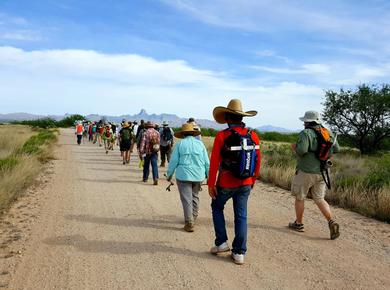Posted: November 25, 2019
As a Canadian, I’m generally pleased to identify with my country. I’m also aware that my family lines moved to this country from Ukraine 100–150 years ago. However, they weren’t Ukrainian – they moved from Prussia, and before that from the Netherlands.
Migration is a part of my story.
As Anabaptists, we trace our history of migration across Europe, and into the rest of the world as settlers and missionaries. As Christians, we can trace the thread of migration back to the early church, spreading Christianity through the Roman empire as we scattered beyond Jerusalem. The Old Testament takes us further: the Babylonian exile, the years in Egypt, Abraham’s journeys – even Adam and Eve leaving the garden of Eden is a sort of migration.
Migration is a part of the human story.
The definition of a migrant is simply a person who is moving across an international border, regardless of whether the stay is voluntary or involuntary, what motivated it, or how long the stay will be.
So, it is perhaps not surprising that the number of migrants today is the highest on record. In 2017, there were some 258 million people – nearly one in 30 – living outside their country of birth, for reasons ranging from sharing the gospel, to pursuing economic opportunity, to fleeing war or violence, to seeking more sustainable living given the effects of climate change, and many more.
Migrants are vulnerable regardless of their reasons for moving. The UN reports that they are often the first to lose their jobs in an economic downturn, they may be paid less than native born, and they are more likely to experience human rights abuses.
Aware of the many challenges migrants face in their own countries, Latin American church leaders developed “Justice on the journey: Migration and the Anabaptist story” as the theme for the Renewal 2027 event held in Costa Rica in 2019. The contents of this issue derive from the presentations made there.
In the Old Testament, we read specific exhortations to treat the foreigner among us with justice, and in the New Testament, there are many calls to show hospitality and to love those who are on the margins of society.
Citing this biblical precedent, Adriana Belinda Rodriguez calls on readers to respond to the migrants around us with obedience and love to God’s commands that we love the stranger.
Also in the features, Jaime Prieto Valladares calls readers to dream in peace and follow Jesus into action that seeks justice for those who are displaced or on the edges of society.
In our Perspectives articles in this issue, you’ll read stories about how our Anabaptist family is extending hospitality through the church to migrants in Kenya, India, Mexico, Germany and USA.
Migrants take many forms and have many motivations. Sometimes they are us, sometimes they are “other,” but always God’s call is to love. How will Anabaptists in all corners of the globe take up the call?
—Karla Braun is editor of Courier and writer for Mennonite World Conference. She lives in Winnipeg, Canada.
This article first appeared in Courier/Correo/Courrier October 2019.

Comments: